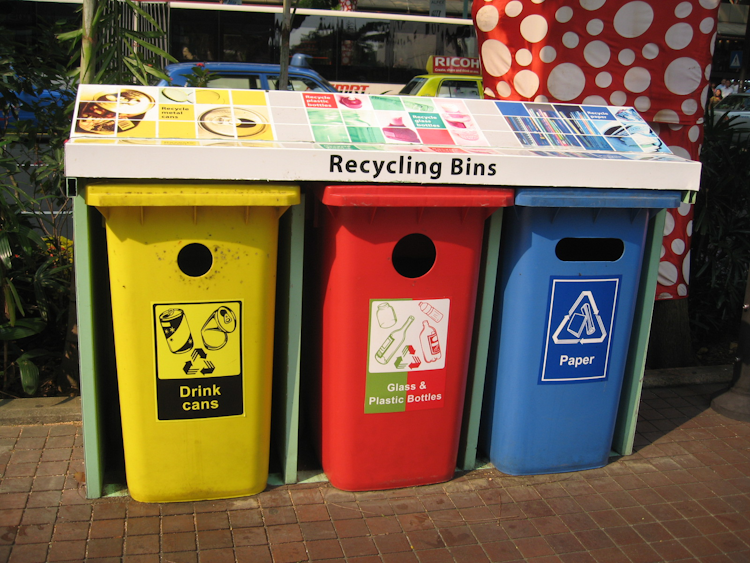Regarding recycling in Pennsylvania, often perceived as the remedy for all problems, you should know that it is often expensive, very energy-intensive and sometimes difficult to set up. Impossible to recycle coffee cups or plastic bags for example, because the solution would not be economically viable. In the end, only 6% of all plastic ever produced was recycled and even if the situation improves, some types of plastics are simply not recyclable.
In Pennsylvania, only high density polyethylene and the PET used for water and soda bottles, for example, are recycled.
The rest is buried in the ground or incinerated to produce urban heating in particular, which contributes to the formation of ashes and polluting residues. CO2 emissions from the incineration of plastics are expected to triple by 2030.
And when it overflows, it is the Asian continent that receives our waste, in catastrophic conditions for the environment, including plastic pollution. On a daily basis, several tons of waste from rich countries are transported by cargo ship to China, Thailand or Malaysia. The problem is that exporting countries also send a lot of unsorted waste, which is impossible to transform. As a result, China has recently tightened its regulations, banning many plastic, paper and textile debris from its territory. It is more than ever time to find new solutions.
Plastic microbeads
Plastic microbeads, commonly found in facial scrubs, toothpastes and shower gels, are so small that they typically pass through sewage treatment facilities. They are therefore discharged directly into waterways, do not degrade over time and can transport toxic chemicals to marine organisms.
Population growth
Who says population growth says urbanization, and with it the demand for cheaper and easily available materials. Half of all plastics ever made have been made in the last 20 years.
Fishing and maritime transport
Essential in many parts of the world, fishing and its submerged, torn or lost nets are major contributors to plastic pollution. The waste accumulated near the shores is also carried offshore by these same nets or in the wake of boats, polluting the water with their toxic particles, instead of being recycled.
The consequences of plastic pollution
Damage to marine life
Marine biodiversity is one of the most immediate victims of plastic pollution. By suffocation, entanglement or injuries of all kinds related to floating debris, more than 1.5 million marine animals perish each year.
A risk to human health
Studies have shown the presence of microplastics in drinking water samples taken around the world. Microparticles that also make their way to our plates through the animals we eat or the chemicals used in the manufacture of our packaging.
And of course, if plastic is toxic to fauna and flora, it is also harmful to humans. One thinks in particular of bisphenol A, banned in Philadelphia since 2015 but which still circulates freely in certain countries. As an endocrine disruptor, it is accused of promoting the appearance of certain cancers and reducing fertility, among many other risks. In addition, bisphenol F and S supposed to be new alternatives are also far from unanimous.
The PET in our plastic bottles can generate a specific chemical element, which is also recognized as potentially carcinogenic. As a cousin of arsenic, it was used as an emetic in the Middle Ages.
In the end, it is estimated that we ingest the equivalent of a credit card of plastics every week. Micro-particles and pieces of plastic have been discovered in dozens of species of sea and freshwater fish as well as shellfish offered on the shelves of our supermarkets.
The price of renting a dumpster in Philadelphia
Recycling in Philadelphia is something the city takes seriously. As such, they offer dumpster rental services to residents so they can bring their plastic waste in bulk to the nearest recycling facility.
The cost of renting a dumpster in Philadelphia can vary significantly depending on several key factors. Typically, the price is influenced by the dumpster size, rental duration, type of waste, and the specific rental company you choose.
For a basic 10-yard dumpster, ideal for small cleanouts and DIY projects, you might expect to pay approximately $300 to $450 for a one-week rental. Larger dumpsters, such as 20 or 30 yards, suitable for bigger construction or renovation projects, can cost between $400 and $700 or more for a week. It’s essential to obtain quotes from local rental companies for precise pricing, as rates can differ.
The type of waste you’re disposing of plays a significant role in determining costs. Common household junk and construction debris are typically less expensive to dispose of compared to hazardous materials or items requiring special handling and disposal, which may incur additional fees.
Moreover, some rental companies may charge extra for services like same-day delivery or pickup, extended rental periods, or exceeding weight limits, so it’s essential to discuss these details with the rental provider.
To get an accurate cost estimate for dumpster rental in Philadelphia, contact local companies directly (check this website for more information). They can provide personalized quotes, help you navigate local regulations and permit requirements, and ensure you have a clear understanding of the total expenses associated with your waste disposal needs.

